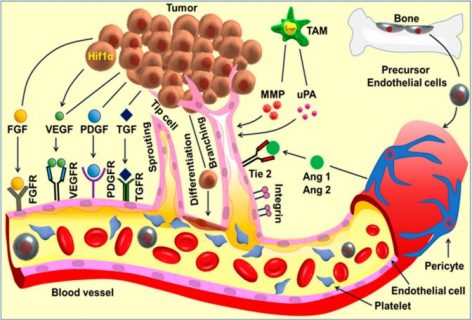
Logout
If you want to log out click in LogOut


The angiogenesis pathway, or the formation of new blood vessels from preexisting vessels, is responsible for a wide variety of physiological and pathological processes. Under normal conditions, angiogenesis is involved in the process of embryonic development, tissue repair and organ regeneration.
The angiogenesis includes a wide range of processes. Among them, vasodilation, endothelial permeability increase, basal membrane disintegration, endothelial cell proliferation, migration, tubule formation, and endothelial cell differentiation and maturation.Researchers have extensively revealed a variety of factors involved in neoangiogenesis. The main protagonists are: Vascular endothelial Growth Factor (VEGF), basic Fibroblast Growth Factor (bFGF), various members of the Transforming Growth factor beta (TGFβ) family and hypoxia (Hypoxia-inducible transcription factor, HIF)... In addition to other angiogenic factors like the angiopoietins, (Ang-1); hepatocyte growth factor (HGF); Platelet-derived growth factor (PDGF-BB); Insulin-like growth factor family (IGF-1, IGF-2) and the Neurotrophins (NGF).
Angiogenesis's mechanism is extremely intricate. It is the outcome of how cells interact with proteolytic enzymes, the extracellular matrix, and cytokines.
One of the earliest events in formation of new blood vessels is the degradation of the vascular basement membrane and the remodeling of the extracellular matrix (ECM).Several matrix metalloproteinases (MMPs), including MMP-2, -3, and -9 play an important role in this system. They associate with tumor progression, including invasion, metastasis, growth and migration..
Integrins are the principle adhesion receptors used by endothelial cells to interact with the extracellular environment and are necessary for cell migration, proliferation, and survival.
Abnormal formation of new blood vessels is the basis of a variety of pathological processes. Among them tumor metastasis, atherosclerotic plaque formation, macular degeneration, retinopathy, ischemic disease, cardiovascular diseases, chronic inflammatory skin …(1-5).
You can custom your own SignArrays® with the genes of interest of your choice, according to your project, you just have to download and complete our Personalized SignArrays® information file and send it at contact@anygenes.com